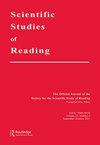Children Processing Novel Irregular and Regular Words During Reading: An Eye Tracking Study
IF 2.4
2区 教育学
Q1 EDUCATION & EDUCATIONAL RESEARCH
引用次数: 4
Abstract
ABSTRACT Children may link words in their oral vocabulary with novel printed word forms through a process termed mispronunciation correction, which enables them to adjust an imperfect phonological decoding. Additional evidence suggests that sentence context may play a role in helping children to make link between a word in oral vocabulary and its irregular written form. Four groups of children were orally trained on a set of novel words but received no training on a second set. Half the trained words were designated irregular spellings and half regular spellings. Children later read the words in contextually supportive or neutral sentences while their eye movements were monitored. Fixations on untrained words were longer than on trained regular words but were similar to trained irregular words. Fixations on regular words were shorter than on irregular words, and there were larger differences between irregular and regular words viewed in contextually supportive sentences. Subsequently, children were able to read irregular words more accurately when they had previously appeared in a supportive context. These results suggest that orally known irregular words undergo additional processing when first viewed in text, which is consistent with the online operation of a mispronunciation correction mechanism.儿童在阅读过程中对新奇不规则词和规则词的加工:眼动追踪研究
儿童可以通过发音错误纠正的过程将口语词汇中的单词与新的印刷单词形式联系起来,这使他们能够调整不完美的语音解码。另外的证据表明,句子上下文可能在帮助儿童将口头词汇中的单词与其不规则的书面形式联系起来方面发挥作用。四组儿童接受了一组新单词的口头训练,而另一组没有接受任何训练。一半被训练的单词被指定为不规则拼写,另一半被指定为规则拼写。随后,孩子们阅读上下文支持或中性句子,同时监测他们的眼球运动。对未经训练的单词的注视时间比对训练过的规则单词的注视时间长,但与训练过的不规则单词的注视时间相似。规则词的注视时间比不规则词短,在语境支持句中不规则词和规则词的注视时间差异更大。随后,孩子们能够更准确地阅读不规则单词,如果这些单词之前出现在一个支持性的环境中。这些结果表明,口头已知的不规则单词在第一次在文本中看到时经历了额外的加工,这与错误发音纠正机制的在线操作是一致的。
本文章由计算机程序翻译,如有差异,请以英文原文为准。
求助全文
约1分钟内获得全文
求助全文
来源期刊

Scientific Studies of Reading
Multiple-
CiteScore
7.20
自引率
2.70%
发文量
26
期刊介绍:
This journal publishes original empirical investigations dealing with all aspects of reading and its related areas, and, occasionally, scholarly reviews of the literature, papers focused on theory development, and discussions of social policy issues. Papers range from very basic studies to those whose main thrust is toward educational practice. The journal also includes work on "all aspects of reading and its related areas," a phrase that is sufficiently general to encompass issues related to word recognition, comprehension, writing, intervention, and assessment involving very young children and/or adults.
 求助内容:
求助内容: 应助结果提醒方式:
应助结果提醒方式:


